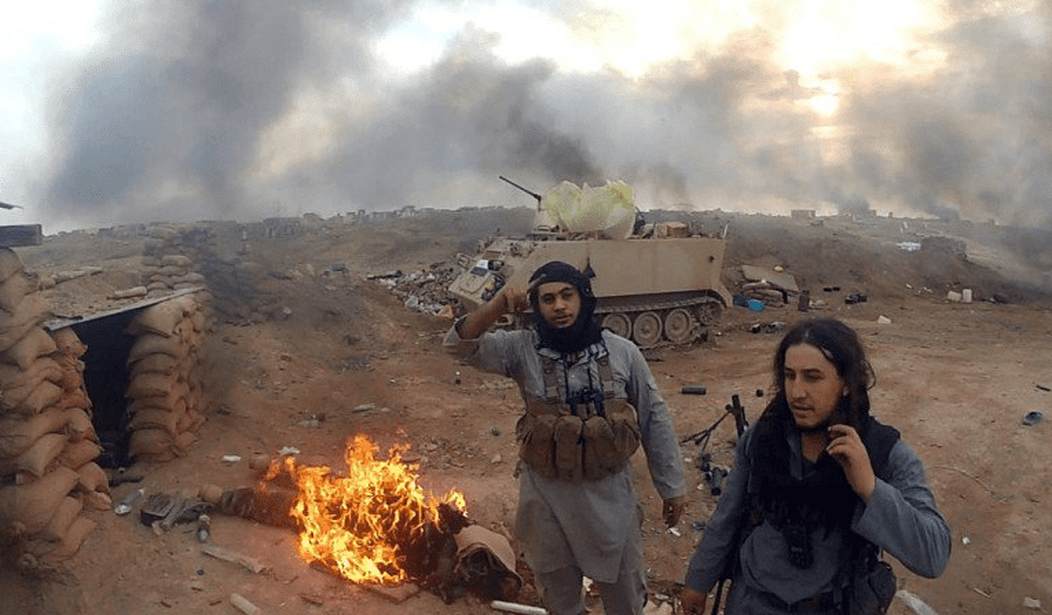Before acknowledging that Congress had not yet granted an authorization of military force, Defense Secretary Ashton Carter declared “we’re at war” in the quest “to accelerate ISIL’s defeat” with more forces on the way.
Carter told the House Armed Services Committee this morning that the United States is “deploying a specialized expeditionary targeting force to assist Iraqi and Kurdish Peshmerga forces and put even more pressure on ISIL” in the region.
“These special operators will, over time, be able to conduct raids, free hostages, gather intelligence and capture ISIL leaders,” he said. “This force will also be in a position to conduct unilateral operations in Syria. That creates a virtual — virtuous cycle of better intelligence, which generates more targets, more raids, more momentum.”
Those raids, he added, “will be done at the invitation of the Iraqi government and focused on defending its borders and building the ISF’s own capability.”
The Defense secretary asserted that coalition efforts are “gathering momentum on the battlefield in Syria and Iraq.”
The strategy, he said, includes “engaging ISIL in the last remaining pocket of access into Turkey” and increasing airstrikes, including on the Islamic State’s oil industry, “to the highest level since the start of operations in August of 2014,” as well as the limited special ops deployment previously announced by President Obama.
“Next, in the south of Syria, we’re also taking advantage of opportunities to open a southern front on ISIL by enabling fighters trained and equipped by us and other coalition partners to conduct strikes inside Syria. We’re also enhancing the border control and defenses of a key ally, Jordan, with additional military assets and assistance,” Carter continued. “…Elsewhere in Iraq, we have about 3,500 troops at six locations in Iraq in support of Iraqi security forces, the ISF.”
Carter said one hope is “that the Syrian-Arab coalition as it rolls south towards Raqqa, is like a snowball that continues to gather people who are tired of ISIL’s rule, who are willing to fight ISIL.” He later added that “the concrete, clear plan has four streams by which we’re trying to get Sunnis included in the fight” in Iraq.
Chairman of the Joint Chiefs of Staff Gen. Joseph Dunford said to be successful against ISIS “the coalition’s military campaign must reduce ISIL’s territorial control, undermine its brand in aura of invincibility and destroy its warfighting capability.”
Dunford told the committee that even before he took over for Gen. Martin Dempsey as Joint Chiefs chairman “leadership across the department recognized that we needed to increase pressure on ISIL by improving effectiveness of our strikes in accelerating our efforts to develop and support effective partners on the ground.”
“In short, we were not satisfied that we were doing everything possible to defeat the enemy,” he said. “…We’re not satisfied or complacent about where we are and we won’t be until ISIL is defeated.”
Carter said it would be “desirable” to have an authorization of military force (AUMF) from Congress, but “the lawyers tell me that we don’t technically need one.”
“But I think it would be helpful, principally because I think you can’t do enough to show the troops that we’re behind them and that this is a big deal and it’s serious and the country is behind them,” the Defense secretary added.
Rep. Randy Forbes (R-Va.) noted that both military leaders expressly testified to the committee that the United States is at war. “Who declared that war?” the congressman asked.
Dunford acknowledged that “if it was a technical declaration of war, it would the Congress,” which has not.
“We are technically not at war,” the Joint Chiefs chairman added under grilling from Forbes.
Asked if the caliphate had been “contained,” a term previously used by Obama in asserting gains have been made against the terrorist group, Dunford replied, “We have not contained ISIL.”
“Tactically in areas they have been. Strategically they have spread since 2010,” he added. “I think the right components for a strategy are in place.”
Carter then weighed in on their use of the word “war,” saying it wasn’t meant to be so technical.
“It feels like that to our people who are engaged in it, and it has that kind of gravity. So it’s not a technical thing, it’s a — it’s a descriptive,” he said.
“In all due respect to the secretary, the word ‘war’ is not just some light term,” Forbes countered. “When we use war, it is a technical word and it needs to be used very, carefully, I think whether we use it in this committee or use it elsewhere.”
Rep. Mike Turner (R-Ohio) asked Carter if we’re winning against ISIS.
“We will win,” the Defense secretary replied.
“Are we winning now?” Turner pressed.
“We are going to win,” Carter said.
Del. Madeleine Bordallo (D-Guam) noted that she just returned from a congressional delegation trip to Afghanistan, Egypt and Saudi Arabia, and “one thing that was brought out in all of the country briefings in these countries was the sharing of intelligence information.”
“It’s not up to par. And if we can accelerate with all of this power, with our allies, I think it would be one way to wipe out this barbarian group once and for all,” Bordallo said.
“Gentlemen, the entire world is on alert. The American people are on edge. There are ISIL cells in our states here in America… And now we’re just all up in the air about whether this is going to hit our own country.”








Join the conversation as a VIP Member